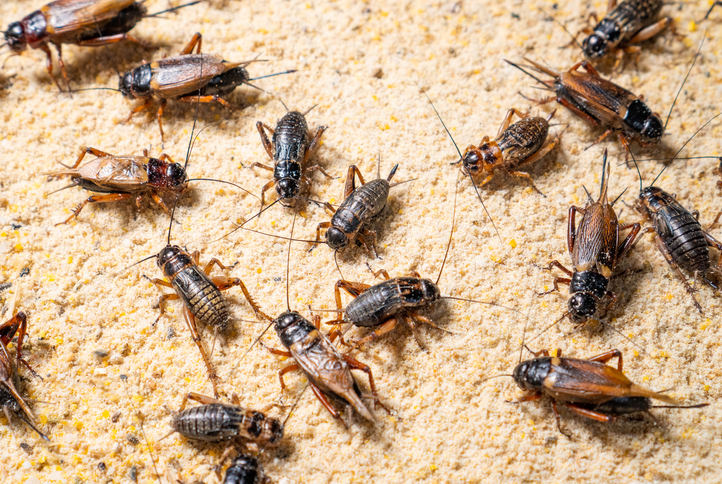Are Crickets Harmful to Humans and Pets?
Are Crickets Harmful to Humans or Pets?
Crickets are generally not harmful to humans as they don’t bite or carry diseases. However, they can cause indirect harm such as property damage and can trigger allergies and asthma due to their droppings and shed skins. For pets, crickets are not toxic, but they can carry parasites that may lead to health issues if ingested. It’s important for pet owners to be aware of these risks and monitor their pets’ interactions with these insects.
The Impact of Crickets on Humans and Pets
Crickets, often seen as mere background noise in the night, are commonly overlooked when considering household pests. However, their presence can be more than just an annoyance. In this article, we’ll explore whether crickets are harmful to humans or pets and how Orkin can assist in managing any cricket-related concerns.
Are Crickets Dangerous?
When considering household pests, crickets are often relegated to the background, perceived more as a nuisance than a threat. However, it’s important to delve deeper into the question: Are crickets actually dangerous to humans and pets? While they are not dangerous in the conventional sense, like some venomous or aggressive pests, crickets can pose certain risks that should not be overlooked.

Save $50
on your first recurring service today with code GET50
The Indirect Threat to Humans
Crickets, by nature, are not aggressive towards humans and do not pose a direct threat through bites or stings. However, their impact can be more subtle yet significant. One of the primary concerns is the damage they can cause to personal belongings. Crickets have a tendency to chew on various materials, including clothes, wallpaper, and upholstery. This not only leads to property damage but can also result in financial losses over time.

GET A PERSONALIZED QUOTE
To protect your home from pests, click here for a free pest control estimate. Our Orkin Pros will create a personalized pest treatment plan for your home or business
or Call (866) 249-0292
The Risk to Pets
Crickets, often seen as benign creatures, can pose unexpected risks to household pets. While they are not inherently toxic and can even be a natural part of the diet for some animals, the danger lies in what they may carry. Understanding these risks is crucial for pet owners to ensure the health and safety of their furry companions.
- Parasitic Concerns – One of the primary concerns with crickets is their potential to carry parasites and worms. These parasites, which can be internal or external, can be transmitted to pets if they consume infected crickets. Common parasites that may be carried by crickets include various types of worms, like roundworms, which can cause gastrointestinal issues in pets.
- Gastrointestinal Distress in Pets – When a pet, such as a cat or dog, ingests a cricket carrying parasites, it can lead to gastrointestinal distress. Symptoms of such distress may include vomiting, diarrhea, loss of appetite, and general malaise. In some cases, if left untreated, these symptoms can escalate to more severe health issues, such as dehydration or nutrient deficiencies.
- Other Health Concerns – Beyond gastrointestinal issues, the ingestion of parasitic crickets can lead to other health problems in pets. For example, certain parasites can affect the pet’s overall immune system, making them more susceptible to other diseases. Additionally, some parasites can cause more specific conditions, such as lungworm, which affects the respiratory system.
Allergies and Asthma: The Hidden Risk
While crickets are often dismissed as harmless, their presence can have unexpected implications for individuals with allergies and asthma. This aspect of cricket infestation is less obvious but can significantly affect the quality of life for those sensitive to allergens.
- The Allergen Factor – Crickets, like many other household pests, contribute to indoor allergens in several ways. Their droppings, shed skins, and even the remains of dead crickets can break down into fine particles. These particles can easily become airborne and infiltrate the indoor air quality of your home. For individuals with allergies, these seemingly insignificant particles can trigger allergic reactions, which may include symptoms like sneezing, coughing, itchy eyes, and a runny nose.
- Exacerbating Asthma – For those with asthma, the presence of cricket allergens in the environment can be more concerning. Asthma, a condition characterized by the inflammation and narrowing of airways, can be exacerbated by airborne allergens. The inhalation of cricket-related particles can lead to asthma attacks, which are not only uncomfortable but can also be dangerous if not managed properly. Symptoms such as wheezing, shortness of breath, chest tightness, and persistent coughing can be aggravated, leading to increased use of asthma medication or even emergency medical attention in severe cases.
- The Importance of Indoor Air Quality – Maintaining good indoor air quality is crucial, especially in homes with individuals prone to allergies and asthma. Crickets, by contributing to the indoor allergen load, can negatively impact this. It’s important to address cricket infestations not just for the sake of comfort, but also for health reasons. Regular cleaning, vacuuming, and dusting can help reduce the presence of cricket allergens. However, these measures are often not enough once an infestation has taken hold.
Prevention is Key
Preventing cricket infestations is often more effective than dealing with an existing one. Some tips include:
- Sealing cracks and openings in your home’s exterior.
- Keeping basements, attics, and crawl spaces well-ventilated and dry.
- Regularly removing trash and debris from around your property.
Orkin’s Approach to Cricket Control
At Orkin, we understand the nuisances and potential risks associated with crickets. Our approach to cricket control involves:
- Inspection – Identifying the source and extent of the infestation.
- Treatment – Implementing strategies to manage and reduce cricket populations.
- Prevention – Offering advice and solutions to prevent future infestations.
When to Call Orkin
If you’re experiencing a cricket infestation, or if you’re concerned about the potential health risks, it’s time to call Orkin. Our experts are trained to handle cricket infestations efficiently and effectively, ensuring your home remains a safe and comfortable environment for you and your pets.
Frequently Asked Questions
Can crickets bite humans or pets?
Crickets have the ability to bite, but it is rare and usually not harmful. Their jaws are not strong enough to break human skin. However, in pets, especially smaller ones, a cricket bite might cause minor irritation.
Are crickets known to carry diseases?
Crickets are not known to carry diseases harmful to humans. However, they can carry parasites that might affect pets if ingested.
Can crickets cause allergies in humans?
Yes, crickets can contribute to allergies in humans. Their droppings, shed skins, and carcasses can become airborne and trigger allergic reactions, particularly in individuals with sensitivities.
What should I do if my pet eats a cricket?
If your pet eats a cricket, generally, there is no need for immediate concern as crickets are not toxic. However, watch for signs of gastrointestinal distress since crickets can carry parasites. Consult a veterinarian if you notice any unusual symptoms.
How can crickets affect indoor air quality?
Crickets can affect indoor air quality by contributing to the allergen load. Their droppings and shed skins can deteriorate air quality, potentially triggering asthma and allergies.
Are crickets harmful to cats or dogs?
Crickets are not inherently harmful to cats or dogs, but they can carry parasites. If a pet consumes a cricket with parasites, it might lead to gastrointestinal issues.
What are the signs of a cricket infestation?
Signs of a cricket infestation include seeing crickets in your home, hearing their chirping, and noticing damage to fabrics or plants.
What should I do if I have a cricket infestation?
If you have a cricket infestation, consider contacting Orkin for professional pest control services. We can provide effective treatment and prevention strategies tailored to your specific situation.
Conclusion
While crickets are often perceived as harmless, their presence in and around our homes can have a range of impacts on both humans and pets. For humans, the risks are primarily indirect, including potential property damage, sleep disruption due to their chirping, and the exacerbation of allergies and asthma due to airborne particles from cricket droppings and shed skins. For pets, particularly cats and dogs, the primary concern is the risk of gastrointestinal distress or other health issues caused by parasites that crickets might carry.
With Orkin’s expertise in pest control, we provide effective solutions to manage cricket populations, thereby reducing their potential impact on your home and health. Our approach is comprehensive, addressing not only the immediate presence of crickets but also focusing on long-term prevention strategies. We understand the nuances of dealing with these pests and offer tailored solutions to ensure your home remains a safe and peaceful environment.

FIND YOUR LOCAL BRANCH
To protect your home from pests, click here for a free pest control estimate. Our Orkin Pros will create a personalized pest treatment plan for your home or business
or Call (866) 249-0292

